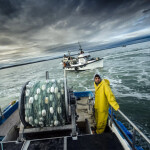The European Parliament passed a sweeping fishery policy reform bill by a healthy margin this week, to the delight of environmental groups and the European Commission, who hailed it as a step toward responsible fishing in Europe.
The law, which reformed the EU’s Common Fisheries Policy (CFP), passed by a vote of 502 to 137, with 27 abstentions. According to the Parliament’s website, the current CFP, which dates back to 2002, includes regulations that are not based on current scientific data and projections, and thus permits overfishing of critically low stocks.
The policy now needs the endorsement of various fisheries ministers within the E.U. to finalize it. The newer version of the CFP, barring further opposition, will take effect next year.
According to figures from the European Commission, 80 percent of Mediterranean fish stocks, and 47 percent of Atlantic stocks are overfished. Rapporteur Ulrike Rodust, who drafted the new CFP, said the new policy will address this problem.
"We have shown today that the European Parliament is anything but toothless,” Rodust said. “We have used our power as a co-legislator, for the first time in fisheries policy, to put a stop to overfishing. Fish stocks should recover by 2020, enabling us to take 15 million metric tons more fish, and create 37,000 new jobs."
Among other reforms, the new CFP will:
- Oblige fishing vessels to land all catches in accordance with a schedule of specific dates for different fisheries, starting from 2014, in order to reduce discarded fish that will usually die in the ocean.
- Set limits, starting in 2015, on quotas set by E.U. member states, preventing them from setting quotas that are too high to be sustainable.
- Rely on multi-annual fish stock management plans, allowing for long-term planning of fishery management.
The vote drew applause from the commission, including Maria Damanaki, commissioner for maritime affairs and fisheries.
"I welcome the vote and I am especially pleased with the Parliament's support for a policy that is based on exploiting fisheries resources sustainably (according to the principle of Maximum Sustainable Yield from 2015), a policy that introduces a discard ban with clear dates to put an end to wasteful practices that we can no longer afford,” Damanaki said.
Environmental conservation groups echoed Damanaki’s sentiments. The World Wildlife Fund (WWF), in a statement, noted the new policy reform includes all the key elements of the WWF’s “wish list.”
“This is a triumph especially in these times of crisis and despite strong opposition from certain politicians with unsustainable industry interests,” said Roberto Ferrigno, WWF’s common fisheries policy project coordinator in Europe. “It’s clear after this vote that it is a political priority to shape up EU fisheries and provide long-term stability to fishing communities, fishermen and businesses and the marine environment they depend on.”
Saskia Richartz, Greenpeace’s E.U. fisheries policy director, also praised the parliament’s vote, and spoke out against the Spanish and French governments, which Greenpeace maintains have fought against reform measures in the past.
“This vote signals a momentous shift away from overfishing and is a testament to parliament’s resolve to defend the general interest,” Richardtz said. “National governments that stand in the way of reform, like Spain and France, will find it increasingly hard to act as proxies for a handful of powerful companies, with no concern for the long-term wellbeing of the oceans or the majority of fishermen.”





